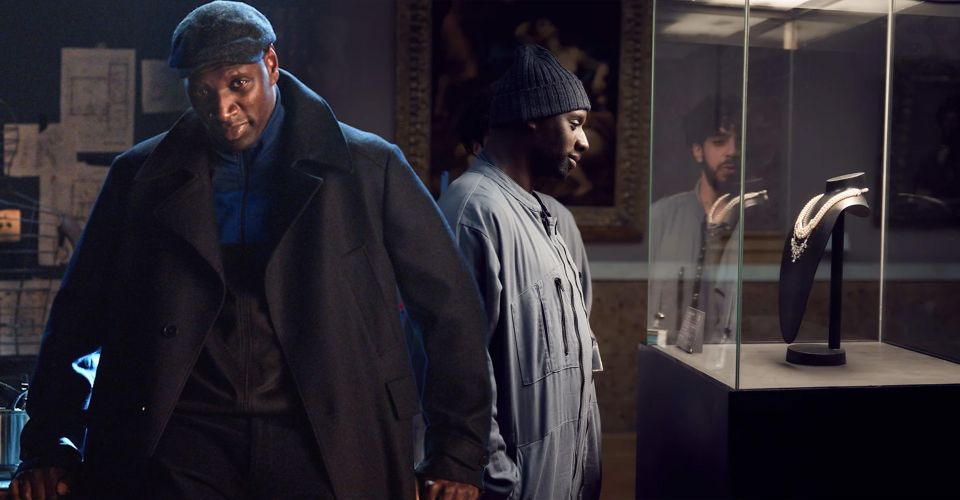Lupin Part 1 Ending Explained (In Detail)

Warning! Spoilers ahead for Lupin part 1.
Lupin part 1’s ending suggests there’s more to come, especially since it delivers some big twists. The French series follows the story of Assane Diop (Omar Sy) as he plans to prove his father Babakar’s innocence after he was accused and imprisoned for allegedly stealing a necklace once belonging to Queen Marie Antoinette from the Pellegrinis — a rich family who deals in fraud and other illegal activities while using their influence to buy the cooperation and silence of police and politicians.
Assane is a charming and clever gentleman thief who is inspired by author Maurice Leblanc’s books about Arsène Lupin. Lupin part 1 ended on a major cliffhanger that saw Assane lose one of his biggest allies in hard-hitting journalist Fabienne Bériot (Anne Benoît) in his schemes to take down Hubert Pellegrini (Hervé Pierre). With his family being threatened and a potential confrontation with an officer set to foil the plans he has in store for Pellegrini, Assane is no closer to outing the wealthy man’s corruption or avenging his father.
The Lupin part 1 ending sets up part 2 in a big way while leaving some answers unresolved. The fifth and final episode in part 1 was different than previous episodes in that it involved no theft or elaborate plans, with Lupin implementing flashbacks that showcased Assane’s relationship with Claire from her perspective and his family’s trip to Le Havre, France in the present. How the ending of Lupin might shape part 2 is still unclear, but here’s what the ending of Lupin part 1 means for now.
Why Youssef Went After Assane On His Own

Assane’s makeup, wigs, and fake names gave the cops the runaround. No matter what information they collected on Assane and his actions, the police were always 20 steps behind when it came to catching him. This was primarily due to the fact that they didn’t have his name or motive. While the rest of the officers were hitting dead ends at every turn, Detective Youssef Guedira (Soufiane Guerrab) was the only one who rightly suspected that Assane was pulling from Maurice Leblanc’s books. Youssef’s suspicions about Assane were either ignored or mocked by the rest of his colleagues for the entirety of season 1, so it makes sense that he would decide to go it alone. Youssef is an experienced detective, but he wasn’t being taken seriously at all.
There’s also the fact that, like Assane, Youssef is a man of color whose skills are undermined by the very people he works with. The police commissioner is the only other man who knows what Assane is doing and refuses to affirm Youssef’s actions. Going after Assane will prove that Youssef wasn’t making things up about how the Lupin books influenced Assane, hopefully earning him an apology from his peers. What’s more, there’s also a sense of intrigue and admiration that Youssef has towards Assane. To be able to evade the police for so long proves that his trickery works and Youssef has seen that first hand. Meeting the man causing such a stir is something Youssef wouldn’t give up. Despite Youssef being a cop, it seems doubtful that he will actually arrest Assane, but coming face-to-face with the man of mystery after pretty much solving the case on his own is certainly a major win for Youssef.
Why Pellegrini’s Henchman Kidnapped Assane’s Son

Following the death of Fabienne, it was only a matter of time before Pellegrini sent someone after Assane. It’s a testament to Assane’s skills that the well-connected man was duped for so long to begin with. Now, Assane’s family has been a part of the story from the beginning and it seemed inevitable that their lives would be threatened at some point, especially with tensions between Assane and Pellegrini at an all-time high. Assane was always in the thick of his thievery, but his job was never much of a threat to his family because no one ever knew his true identity. Plus, Assane was so involved in his job that he often forgot and sometimes purposefully avoided seeing his son anyway.
However, for all that Pellegrini is scary and violent, he isn’t very interested in harming Assane’s family or using them for leverage against the gentleman thief, likely because he doesn’t want to involve any more people so as to avoid further suspicion and bad publicity. But, Assane always tends to rub people the wrong way and sending the cops after Pellegrini’s henchman Leonard (Adama Niane) ruffles the man’s feathers enough for him to take extreme measures and kidnap Assane’s son Raoul, abandoning his initial plans. Leonard will have to answer to Pellegrini and there’s no way that there won’t be consequences for ignoring his firm orders to kill Assane and leave Claire and Raoul alone. It turns out that a nice family outing just wasn’t in the cards for Assane and Leonard kidnapping Raoul was an unexpected twist in Lupin‘s final moments that will surely roll over into part 2.
The Real Meaning Of Lupin Part 1

Lupin does an exceptional job of tackling the ways in which wealth, power, and influence allows families like the Pellegrinis to get away with crime and illegal activity while maintaining the cover of moral decency. While Hubert Pellegrini plots and schemes behind-the-scenes, his daughter Juliette supports foundations with the family’s money. These themes are reflective of real life and the ways in which the rich can often get away with anything while screwing over the poor. Meanwhile, Babakar, a working class Senegalese immigrant, is blamed for a crime he didn’t commit and imprisoned unjustly. Although Assane also commits a few crimes himself, Lupin allows the audience to ponder who really is the thief and master of deception in this instance. Is it Pellegrini, who harms others for his own personal gain? Or is it Assane, who has mastered his skills to avenge his father?
The answer is pretty obvious based on the plot, but the series goes beyond painting Pellegrini as the only guilty party. Lupin explores how police and other societal institutions uphold the status quo by keeping Assane and hard-hitting journalists like Fabienne silenced. Lupinalso deftly addresses the ways in which racism plays a role in how Assane is viewed and what he is allowed to be based on society’s standards. This is showcased when he is able to switch places with Comet, a Black inmate imprisoned for selling weed, without security batting an eye. However, when Assane enters a wealthy space and bids millions to buy the queen’s necklace, he is looked upon with suspicion by the attendees, who whisper behind gloved hands.
About The Author


















